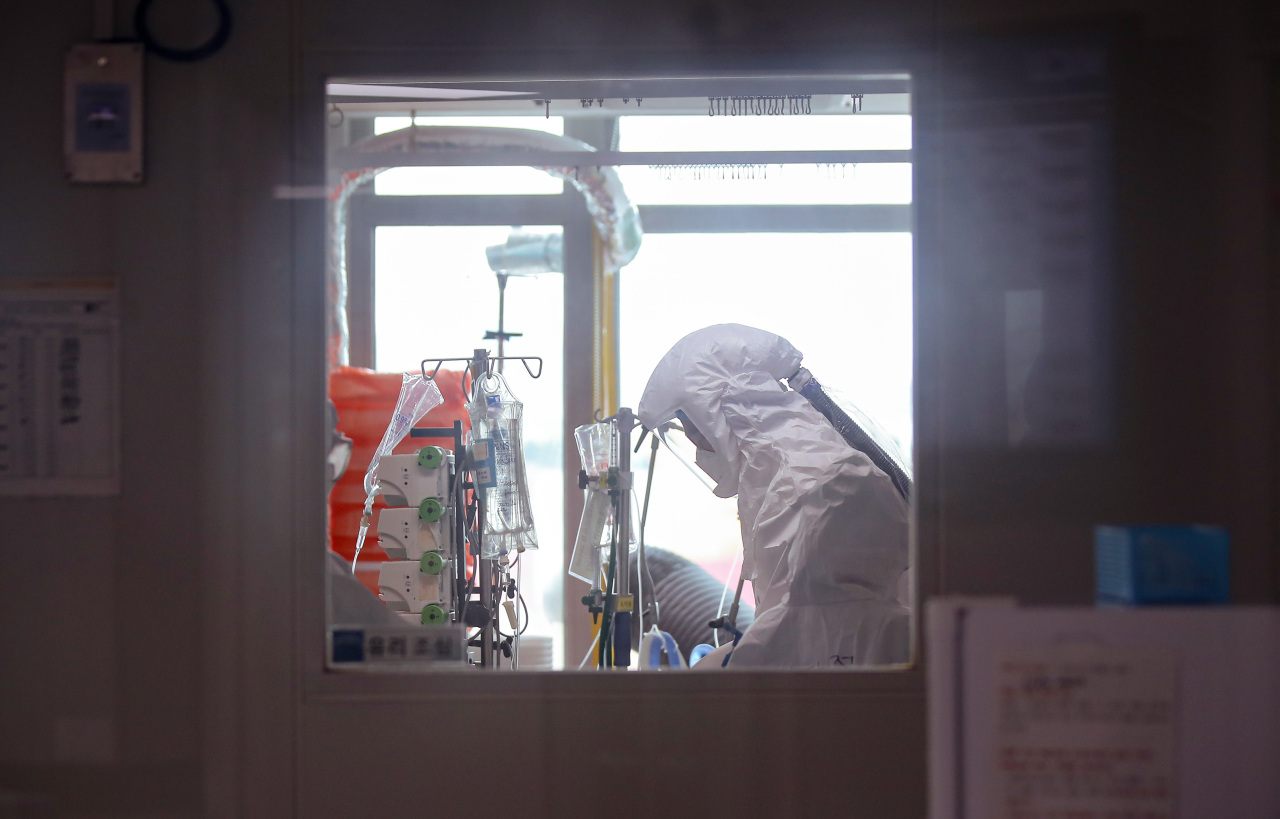No plan yet to offer COVID-19 booster shots in Korea
Nursing homes suffer outbreaks among vaccinated residents, staff
By Kim ArinPublished : Aug. 17, 2021 - 18:03

Nursing homes and hospitals across South Korea are reporting outbreaks of post-vaccination infections, called breakthrough cases, with some experts suggesting a possible need for an extra shot in vulnerable people.
Nursing facilities are “back in crisis mode,” according to Dr. Son Deok-hyeon, the director of Eson nursing hospital in Ulsan. Visits are restricted, and staff required to get tested regularly.
For those working with elderly patients, the memory of the last surge is still fresh, he said. In a string of nursing home outbreaks, more than 800 people had died between mid-December through January. This time, the damage is much less than feared thanks to vaccination.
The Korea Disease Control and Prevention Agency on Tuesday said there have been nine outbreaks of breakthrough cases at nursing homes and other senior care facilities since the last week of July. Among the 159 people who suffered breakthrough cases in these outbreaks, three died and seven had to be put on life support.
Son said it was “hard to make a case for vaccine boosters when so many in Korea have yet to receive any vaccination at all.”
“Still, if the key goal of the vaccine program is to protect people from risks of deaths and severe complications, now may be time to start preparing for a third shot for older adults and other vulnerable populations,” he said.
When nursing facilities have requested additional vaccinations later in the year about a month ago, Son said health authorities told them “it would all depend on the available vaccine supplies.”
Last week, Korea had to lengthen the interval between two doses of mRNA-type vaccines to six weeks from the standard three to four weeks due to a delay in vaccine shipments.
Infectious disease professor Dr. Kim Woo-joo of Korea University said that for residents of long-term care facilities who were among the first to be vaccinated, their immunity was probably beginning to wane.
“People with weak immune systems, either because they have gotten therapies or have conditions that weaken the body’s ability to respond to exposure may need the extra protection,” he said. “Whether everyone needs a booster is questionable, nor are we saying that people should routinely get boosters.”
KDCA Commissioner Jeong Eun-kyeong said earlier that residents of nursing homes and other long-term care facilities will need another round of vaccination, but that data including antibody levels needed to be analyzed before a decision is made.
Dr. Choi Eun-wha, head of the national committee on immunization practices, said in a brief text response to The Korea Herald that no discussion had taken place but that a review on the matter was “probably in order soon.”
The US, meanwhile, has authorized an additional dose of the Pfizer or Moderna vaccine for people with compromised immune systems.
The latest available data from last week, which looked at cases logged up to Aug. 5, showed there had been 1,540 breakthrough cases in the country -- meaning that just 23.6 out of every 100,000 fully vaccinated people had come down with a coronavirus infection.
When broken down by vaccine, Johnson & Johnson’s one-dose vaccine had the highest incidence of breakthrough infections with 65.7 cases per 100,000 people. This was followed by AstraZeneca’s at 31.4 per 100,000 and Pfizer’s at 12.2 per 100,000.
So far it is not yet known which vaccines are more likely to produce longer-lasting immunity.
“Getting a third shot may be important for certain vaccines than others. We’re still trying to understand which vaccines those are,” said the International Vaccine Institute’s director general Dr. Jerome Kim in a phone interview.
Pfizer, for one, posted a non-peer-reviewed study on July 28 suggesting the efficacy of its vaccine gradually declines over time. The latest data for the mRNA vaccines showed good levels of protection six months after the vaccination, the vaccine institute chief said, and soon, data from AstraZeneca probably will render similar results.
“It looks like the vaccines that are approved in Korea, by and large continued to work at least six months,” he said. “For Korea, the goal will be to vaccinate more of its population as quickly as possible, then come back to the higher risk groups with additional booster vaccinations.”
Currently Korea is distributing first doses of either Pfizer or Moderna shots to people in their 50s. As vaccinations roll out in the order of age, for those younger than 50, their turn for first-dose vaccinations comes after Aug. 25.
More than five months into the national vaccination campaign, Korea has inoculated 43 percent of its 51 million people with at least one dose of a vaccine, while 19 percent have been fully vaccinated. The aim is to complete vaccinations for 70 percent of the population between October and November.
Korea has secured a total of 193.4 million doses of COVID-19 vaccines through deals with five pharmaceutical companies -- AstraZeneca, Pfizer, Moderna, Johnson & Johnson and Novavax -- and COVAX, an international vaccine-sharing program. Of these, 76.2 million doses have made it into the country so far, with 11 million doses remaining here as of midnight Sunday.
According to the government announcement Monday, 7.5 million doses of Pfizer’s vaccine, 9.1 million doses of Moderna’s and 1.1 million doses of AstraZeneca’s are scheduled to be delivered between now and the end of this month. Then in September, 42 million more doses of vaccine are set for arrival, though how much of each type is not yet disclosed.
By Kim Arin (arin@heraldcorp.com)










![[Today’s K-pop] BTS pop-up event to come to Seoul](http://res.heraldm.com/phpwas/restmb_idxmake.php?idx=644&simg=/content/image/2024/04/17/20240417050734_0.jpg&u=)






![[KH Explains] Hyundai's full hybrid edge to pay off amid slow transition to pure EVs](http://res.heraldm.com/phpwas/restmb_idxmake.php?idx=652&simg=/content/image/2024/04/18/20240418050645_0.jpg&u=20240419100350)

